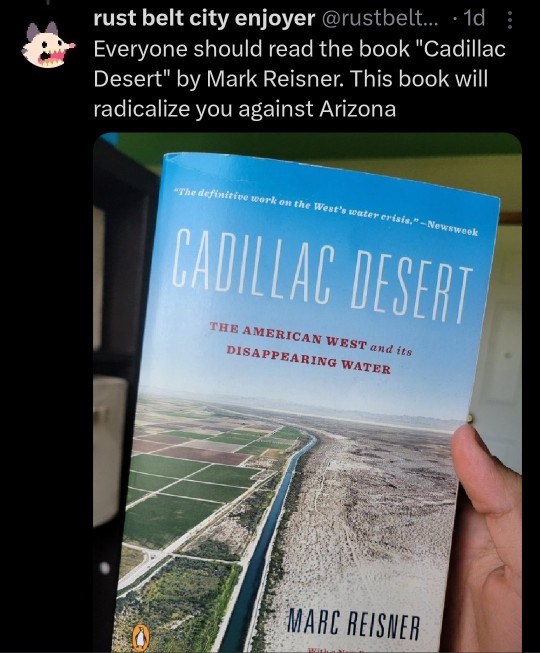if i had more energy i'd take up a violent sport
Last active 2 hours ago
Don't wanna be here? Send us removal request.
Text
With the summer heat rolling in I really wanted to take a moment and highlight a program I am a big fan of, A.N.E.

"Adopt-A-Native-Elder (A.N.E.) serves to help reduce extreme poverty and hardship facing traditional Elders living on the Navajo Reservation. A.N.E. is a trusted humanitarian organization focused on delivering food, medical supplies, firewood and other forms of Elder support. Respecting the tradition and dignity of Navajo Elders, we create relationships and honor and serve the Elders. The Program is organized in the Native American Spirit of the Giveaway Circle. The Giveaway Circle has a tradition of giving the best that we have. That may be a gift of time, talents or skills, or actual gifts of food and donations. When asked what the boxes of food meant to her, Ruth Benally explained that they were like "miracles from the sky." The miracle is the letters and gifts that arrive from people that they don't know and may never meet. For over 30 years, Adopt-A-Native-Elder has used an integrated approach to go beyond charity to assist indigent Elders on the Navajo Reservation in Utah and Arizona."




A.N.E also puts on an annual rug show & sale, you can read about last years here. Apart from their annual events they also host an online shop where you can buy jewelry, woven baskets, and elder made rugs. All proceeds go towards providing support for our elders be it food, medical assistance, firewood, weaving supplies and so much more.
Not in the market for beautifully made Indigenous crafts? Well they also accept general donations, buy specific items for elders in need, food certificate sponsors, rug show sponsors, and of course adopting an elder.
Adopt a Native Elder Website, Instagram, Facebook, & Twitter
9K notes
·
View notes
Text
Please take a moment to read this. A Canadian company wants to build a sulfide copper mine near Lake Superior, which holds 21% of the world’s freshwater. The mine would produce 98.5% toxic waste, stored in a dam just two miles from the lake. The dam can only withstand a 1-in-100-year storm, but the area has had two 1-in-1,000-year storms in the past decade. If it breaks, toxic water could flood the lake. Copper sulfide mines in the U.S. have consistently contaminated nearby water sources, and this mine could hurt local communities with lower employment, income, and property values. The company wants $50 million in taxpayer funding to move forward. The Michigan Senate is about to vote, if they don’t get the funding they can’t build it.
Sign this petition if you want to prevent this disaster by searching “Protect the Porkies, Protect Lake Superior— Stop the Copperwood Mine!” at change.org.
21K notes
·
View notes
Text

clearly the rnc is demographically targeting my childhood third grade class at recess
33K notes
·
View notes
Photo

This is the picture Amazon sent my BIL to say the packages were “delivered to a family member directly”
170K notes
·
View notes
Video
Ok def was not expecting this level of relatability
292K notes
·
View notes
Note
Please make a post about the story of the RMS Carpathia, because it's something that's almost beyond belief and more people should know about it.
Carpathia received Titanic’s distress signal at 12:20am, April 15th, 1912. She was 58 miles away, a distance that absolutely could not be covered in less than four hours.
(Californian’s exact position at the time is…controversial. She was close enough to have helped. By all accounts she was close enough to see Titanic’s distress rockets. It’s uncertain to this day why her crew did not respond, or how many might not have been lost if she had been there. This is not the place for what-ifs. This is about what was done.)
Carpathia’s Captain Rostron had, yes, rolled out of bed instantly when woken by his radio operator, ordered his ship to Titanic’s aid and confirmed the signal before he was fully dressed. The man had never in his life responded to an emergency call. His goal tonight was to make sure nobody who heard that fact would ever believe it.
All of Carpathia’s lifeboats were swung out ready for deployment. Oil was set up to be poured off the side of the ship in case the sea turned choppy; oil would coat and calm the water near Carpathia if that happened, making it safer for lifeboats to draw up alongside her. He ordered lights to be rigged along the side of the ship so survivors could see it better, and had nets and ladders rigged along her sides ready to be dropped when they arrived, in order to let as many survivors as possible climb aboard at once.
I don’t know if his making provisions for there still being survivors in the water was optimism or not. I think he knew they were never going to get there in time for that. I think he did it anyway because, god, you have to hope.
Carpathia had three dining rooms, which were immediately converted into triage and first aid stations. Each had a doctor assigned to it. Hot soup, coffee, and tea were prepared in bulk in each dining room, and blankets and warm clothes were collected to be ready to hand out. By this time, many of the passengers were awake–prepping a ship for disaster relief isn’t quiet–and all of them stepped up to help, many donating their own clothes and blankets.
And then he did something I tend to refer to as diverting all power from life support.
Here’s the thing about steamships: They run on steam. Shocking, I know; but that steam powers everything on the ship, and right now, Carpathia needed power. So Rostron turned off hot water and central heating, which bled valuable steam power, to everywhere but the dining rooms–which, of course, were being used to make hot drinks and receive survivors. He woke up all the engineers, all the stokers and firemen, diverted all that steam back into the engines, and asked his ship to go as fast as she possibly could. And when she’d done that, he asked her to go faster.
I need you to understand that you simply can’t push a ship very far past its top speed. Pushing that much sheer tonnage through the water becomes harder with each extra knot past the speed it was designed for. Pushing a ship past its rated speed is not only reckless–it’s difficult to maneuver–but it puts an incredible amount of strain on the engines. Ships are not designed to exceed their top speed by even one knot. They can’t do it. It can’t be done.
Carpathia’s absolute do-or-die, the-engines-can’t-take-this-forever top speed was fourteen knots. Dodging icebergs, in the dark and the cold, surrounded by mist, she sustained a speed of almost seventeen and a half.
No one would have asked this of them. It wasn’t expected. They were almost sixty miles away, with icebergs in their path. They had a respondibility to respond; they did not have a responsibility to do the impossible and do it well. No one would have faulted them for taking more time to confirm the severity of the issue. No one would have blamed them for a slow and cautious approach. No one but themselves.
They damn near broke the laws of physics, galloping north headlong into the dark in the desperate hope that if they could shave an hour, half an hour, five minutes off their arrival time, maybe for one more person those five minutes would make the difference. I say: three people had died by the time they were lifted from the lifeboats. For all we know, in another hour it might have been more. I say they made all the difference in the world.
This ship and her crew received a message from a location they could not hope to reach in under four hours. Just barely over three hours later, they arrived at Titanic’s last known coordinates. Half an hour after that, at 4am, they would finally find the first of the lifeboats. it would take until 8:30 in the morning for the last survivor to be brought onboard. Passengers from Carpathia universally gave up their berths, staterooms, and clothing to the survivors, assisting the crew at every turn and sitting with the sobbing rescuees to offer whatever comfort they could.
In total, 705 people of Titanic’s original 2208 were brought onto Carpathia alive. No other ship would find survivors.
At 12:20am April 15th, 1912, there was a miracle on the North Atlantic. And it happened because a group of humans, some of them strangers, many of them only passengers on a small and unimpressive steam liner, looked at each other and decided: I cannot live with myself if I do anything less.
I think the least we can do is remember them for it.
275K notes
·
View notes
Text
Pride history posts on here seem almost exclusively to revolve around Stonewall which can leave the impression that America is the only place where anything important ever happened and obviously is not true so I have compiled a few links where you can learn about LGBTQ history in other countries! Feel free to add
The Brunswick Four and the Toronto raids in Canada 🇨🇦
Queer icons like Virginia Wolf, Oscar Wilde, and Freddie Mercury in Britain 🇬🇧
Cultural revolution in Weimar Germany 🇩🇪
The drag scene in Nigeria 🇳🇬
Gay and lesbian Mardi Gras in Australia 🇦🇺
Frida Kahlo and Mexicos fraught history 🇲🇽
Gay samurai in Japan 🇯🇵
Queer narratives erased by colonialism in Pakistan 🇵🇰
The modern world’s first legal same-sex marriages in the Netherlands 🇳🇱
The honoured Mahu (transgender individuals) in traditional Hawaiian culture 🌺
Hidden queer communities in communist Poland 🇵🇱
Husbands in ancient Egypt 🇪🇬
The Athens pride festival in Greece 🇬🇷
The Homosexual Movement of Liberation in Chile 🇨🇱
Gay rights protests in India 🇮🇳
52K notes
·
View notes
Text

my trick for getting through grad school is learning to navigate the quadrants with all their nuances
123K notes
·
View notes
Text
😳 <- this emoji but without the blush or romantic connotation. im not blushing im staring you directly in your fucking eyes
244K notes
·
View notes







